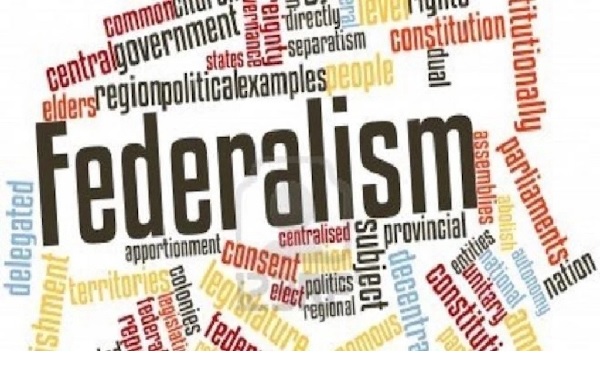As a nation of bewildering diversities; with over 250 ethnolinguistic groups, Nigeria pushed for the adoption of federalism to ensure political inclusion, wider distribution of public resources, and a balance of power across the three tiers of government. Though some shortcomings of federalism abound, there are several ways federalism is of importance in Nigeria. In this article, the importance of federalism in Nigeria will be addressed.

The importance of federalism in Nigeria will be addressed below:
-
Closes the Gap between the Government and Citizens
In a country as culturally diverse and large as Nigeria, federalism is a constitutional device to bridge the gap between the government and the citizens. As Nigeria practices a three-tier type of federalism, the citizens are closer to their local governments and state governments, which allows for their voices to be heard, as well as get involved in the political process. Therefore, as the leaders are close to their subjects, they will be able to understand their needs and priorities.
With the substantial powers conferred on the states and local governments, the subnational units of government of the day can exert democratic control and develop policies tailored to the needs and aspirations of their governed subjects. So, unpopular, unsuitable, and impractical policies that are usually formed without the needs and aspirations of the people, are consequently prevented through federalism.
-
Promotes Innovative Approaches to Policy Development
State governments and local governments have access to better information about the conditions of the populace under their jurisdiction, which facilitates policy development tailored towards their peculiar aspirations and needs. To cater to specific problems under their jurisdictions, state governments sometimes have to develop practical policies that may not be politically viable at the federal level, but attend to the peculiar needs of their people. Federalism, hence, promotes innovative approaches to policymaking at state and local government levels.
-
Eases Burden of Federal Authorities
Another important role of federalism in Nigeria is that it reduces the burden on the federal government. State governments, as well as local governments, provide public services within their respective jurisdictions. State governments and local governments offer domestic administration and the provision of public services within their administration. If the federal government is left to bear the burden of the 774 local government areas and the 36 states in the country, it will inhibit the capacity of the central government to concentrate on strategic challenges and national priorities. So, as the state and local governments allow the federal government to focus on more pressing national challenges facing the country.
-
Ensures Wider Distribution of Public Resources
For domestic administration and provision of social services to work at the subnational units, states, and local governments need resources. States usually generate funds from personal income taxes and other levies, however, the monthly allocations from the Federation Account Allocation Committee (FAAC) based on a horizontal allocation formula, account for the bulk of states’ finances in Nigeria. Similarly, local governments also receive allocations from the federal government, as well as from internally generated revenue.
Out of the total revenue generated by the federal government, 26.72% is distributed to the states, while 20.60% goes to the local governments. These allocations from the federal government which reach the subnational units are used to achieve the socio-economic goals of each state and local government area.
-
Encourages the Development of Democratic Responsibilities and Capacities
As a country that practices federalism, the numerous state institutions in the country provide a valuable opportunity for citizens, representatives, and public officials to develop capacities and democratic responsibilities. Across the 36 states, and 774 local governments in Nigeria, there are numerous institutions and political offices that serve as a training ground for citizens and public officials alike, to contribute to the development of increased participation in decision-making and politics. For instance, the former President of Nigeria, Goodluck Ebele Jonathan, held several positions in his home state of Bayelsa, where developed his leadership qualities, before becoming president.
-
Broadens Power Sharing between Parties
Federalism makes it possible for political parties or groups that do not have nationwide recognition, to be able to hold political office in their respective states and local government areas. APGA, for instance, has won the gubernatorial election in Anambra state against other political parties at the federal level who also sought to occupy the position. Hence, federalism in Nigeria strives to promote political inclusion.
It was in 1954, following the 1953 Lyttleton constitution conference, that Nigeria pushed for the adoption of a federal structure. At that point, Nigeria emerged as a federation of three ethnic regions, which were the major ethnic groups. Ten years after, in 1964, the midwestern region was added to bring the total number to 4. As time passed, more new states were created, until it reached 36 states by 1996. At the grassroots, there are 774 local government areas in Nigeria.
With over 250 diverse ethnic groups, federalism was adopted as an institutional remedy to the problems associated with scale and diversity. The gains of federalism in Nigeria have been enormous since its adoption, however, there are potential shortcomings. The potential disadvantages include, but are not limited to the additional operational cost of governance, duplication of work and lack of coherence, instabilities and threat to democracy, potential exclusion of minority groups, increasingly regional discrepancies of wealth, resources and outcomes, harmful economic competition between subnational units and ineffective governance due to lack of capacity.
The bulk of funds that the states and local government areas in Nigeria receive are from the allocations from the federal government, through the Federation Account Allocation Committee. Internally generated revenue from personal income taxes and levies usually fall short when compared with the federal allocations states get. 14 states in Nigeria rely on the allocations from the Federation Account Allocation Committee (FAAC) for at least 90% of their budget. The allocation from the federal government has made some states lazy in putting efforts toward internal revenue generation. This is inimical to favourable economic growth in Nigeria.